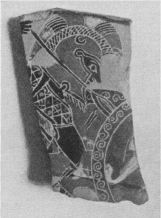The Society for the Promotion of Hellenic Studies
List of Members
-
- Published online by Cambridge University Press:
- 23 December 2013, pp. ix-xi
-
- Article
- Export citation
Meetings of the Session, 1934–35
-
- Published online by Cambridge University Press:
- 23 December 2013, pp. xiii-xv
-
- Article
- Export citation
Financial Statement
-
- Published online by Cambridge University Press:
- 23 December 2013, pp. xvi-xviii
-
- Article
- Export citation
Other
Supplement no. XII to the Subject Catalogue of the Joint Library
-
- Published online by Cambridge University Press:
- 23 December 2013, pp. 1-25
-
- Article
- Export citation
Twenty-First list of Accessions to the Catalogue of Slides
-
- Published online by Cambridge University Press:
- 23 December 2013, pp. 26-29
-
- Article
- Export citation
Research Article
Zeus-Loved Achilles
-
- Published online by Cambridge University Press:
- 23 December 2013, pp. 113-123
-
- Article
- Export citation
A Corinthian Plastic Vase in the National Museum at Athens
-
- Published online by Cambridge University Press:
- 23 December 2013, pp. 124-127
-
- Article
- Export citation
A New Fragment of the Parthenon Frieze?
-
- Published online by Cambridge University Press:
- 23 December 2013, pp. 128-129
-
- Article
- Export citation
Dates in Early Greek History
-
- Published online by Cambridge University Press:
- 23 December 2013, pp. 130-146
-
- Article
- Export citation
Archaeology in Greece, 1934–1935
-
- Published online by Cambridge University Press:
- 23 December 2013, pp. 147-171
-
- Article
- Export citation
The Progress of Greek Epigraphy, 1933–1934
-
- Published online by Cambridge University Press:
- 23 December 2013, pp. 172-223
-
- Article
- Export citation
Notes
An Attic Black-figure Cup-fragment
-
- Published online by Cambridge University Press:
- 23 December 2013, pp. 224-227
-
- Article
- Export citation
More Boeotian Geometricising Vases
-
- Published online by Cambridge University Press:
- 23 December 2013, pp. 227-228
-
- Article
- Export citation
The “Aphrodite” of Lyons
-
- Published online by Cambridge University Press:
- 23 December 2013, p. 228
-
- Article
- Export citation
Mystical Allusions in the Oresteia
-
- Published online by Cambridge University Press:
- 23 December 2013, pp. 228-230
-
- Article
- Export citation
The Dionysiac Painter
-
- Published online by Cambridge University Press:
- 23 December 2013, pp. 230-232
-
- Article
- Export citation
New Light on the Grylli
-
- Published online by Cambridge University Press:
- 23 December 2013, pp. 232-235
-
- Article
- Export citation
Notices of Books
The Palace of Minos: a comparative account of the successive stages of the early Cretan Civilisation as illustrated by the Discoveries at Knossos. By SirArthur Evans. Vol. IV, in two Parts. Pp. 1018, with 966 figures in the text, Coloured Plates XXVII–XXXV, Supplementary Plates XLIII–LXIX, and four General Plans. London: Macmillan & Co., 1935. £9 9s.
-
- Published online by Cambridge University Press:
- 23 December 2013, pp. 236-238
-
- Article
- Export citation
The Swedish Cyprus Expedition: Finds and Results of the Excavations in Cyprus, 1927–1931. By Einar Gjerstad and others. Vol. I, pp. l + 578; Vol. II, pp. xlv + 861. Plates, Vol. I, 155; Vol. II, 250. Stockholm: The Swedish Cyprus Expedition, 1934 and 1935.
-
- Published online by Cambridge University Press:
- 23 December 2013, pp. 238-240
-
- Article
- Export citation
Die Grabhügelnekropole bei Duvanlij in Südbulgarien. By Bogdan D. Filow with the co-operation of Ivan Welkow and Vassil Mikow. Pp. vii + 242; 16 plates and 229 illustrations in the text. Sophia: Bulgarian Archaeological Institute, 1934.
-
- Published online by Cambridge University Press:
- 23 December 2013, pp. 240-242
-
- Article
- Export citation

